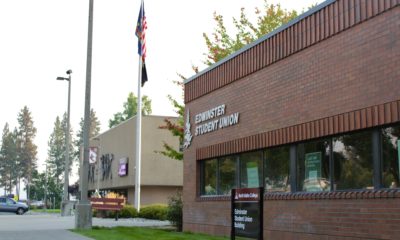Drop your mind off in the most rural part of your imagination. I am talking literally over the mountains and through the woods, other side of the railroad tracks kind of Idaho rural, way out in the boonies.
Deep in the valley between the Selkirk and Cabinet Mountain Ranges rests my neighborhood. I live beyond the “drop zone” of cell reception. Not even a text message relays here. High-speed Internet? Forget it. What’s that, anyway? Does it have something to do with the Google?
Internet is available to some folks out here via a satellite provider. The problem with satellite Internet is that speeds vary, and the service can fall out with the passing of a thick cloud.
My home happens to be on the wrong side of the mountain, where the trees are too tall. I do have great views and, frankly, I love where I live. Online education in a mostly rural situation would make sense for many students, when considering transportation cost and busy schedules. However, I have learned the hard way that when faced with latency, updates and upgrades, repair this or defrag that, I prefer the lively classroom old-school education in contrast to the ominous online classes void of human contact.
The live classes still require a strong computer literacy, and right they should. We are operating in the 21st century, competing with other 21st century students. However, the completely online delivery of education seems like it should be cheaper, even though it costs the same as traditional classes. Whether logged in at a campus computer lab or loosely connected to the net at a friendly neighbor’s house, countless hours drift by, time spent waiting for online studies to load, download, open, search, and attach.
I remember much of what was taught and explained in the live classrooms. I am grateful for those students who thought of a question and courageously spoke up. Logging onto a discussion board does not seem to have the same effect.
I have become one of those students who avoid the online classes, unless all else fails. Not out of a fear or ignorance of technology, but out of a discontent for that type of an educational delivery. Then again, I began my first semester with yoga…just yoga. That’s right, only one class that
semester. I loved it.
Online classes are not less difficult, and the semester schedules still apply. The online classes do allow for more creative use of one’s time, the course material is available to download, and the instructors do respond quickly to questions. However, apprehension lurks with the lack of development of one’s interpersonal skills that the online environment fosters. Improvement of cooperative problem solving and the enhancement of one’s educational experience warrant the “online classrooms” role rather than the devaluation of academia.
Just because students ask for a “McEducation” does not mean a college need provide one. Perhaps we can find a way to integrate the two delivery methods a little more effectively. Online classes are great for conflicting schedules and reducing a student’s transportation costs. However, online classes do not deliver an education as well as a live classroom setting. Should they cost the same?
I am appreciative of the educational opportunities that NIC provides. Thank you, NIC, for the outreach centers. Otherwise, the whole idea of going back to school would have simply remained a dream, not only for me, but also for many other students who live in the rural, mountain-locked areas of this state.
Opinions expressed in editorial and opinion articles are the views of individual NIC students. These views do not necessarily reflect the opinions of the Sentinel, North Idaho College, or any other organizations or groups there-in. North Idaho College is not responsible for the accuracy of statements or opinions shared.













